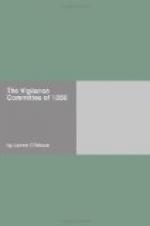Now, as to Casey: he has been described as a ruffian and villain of irredeemable depravity — desperate to the last degree. James P. Casey was a young man of bright, intelligent and rather prepossessing face, neat in his person, inclined to fine clothes, but not flashy or gaudy in his attire. He was of low stature, slender frame, lithe and compact, sinewy, nervous, and very agile. His eyes were blue and large, of bold expression. His voice was full and sonorous. He had served as Assistant County Treasurer for two years, handled a large aggregate of money in that capacity, and his accounts squared to a cent when he handed over the books to his successor. He was twice Supervisor. His record in that office will favorably compare with that of any who have succeeded him. During his lifetime in San Francisco he was never accused of crime; never suspected of criminal offence. Ballot box stuffing was charged to his account; also fraudulent counting in elections. Doubtless there was foundation for each charge. But there were members of the Executive Committee who had been associated with him in these gross wrongs, and at least one of them had gained place and profit therefrom; and these equally or more guilty men voted to hang their former associate in evil deeds. It may be remarked, further, that in the face of the colossal frauds of Returning Boards and Canvassing Boards within the last dozen years, in States South and in the States North, by which the people were defrauded of their choice for President on two occasions, the offences of Casey in the comparatively small matter of a municipal election, are better left unmentioned. Even now, in San Francisco, how many are there in local office who can with clear conscience declare their innocence of crookedness or corruption, or fraud in elections? When it comes to throwing the stone at the staked sinner, conscience palsies the arm of many who feel disposed to throw it. Casey was once in the city prison for riotous conduct. At a very hotly contested democratic primary election, in the early fall of 1855, between the Broderick and




